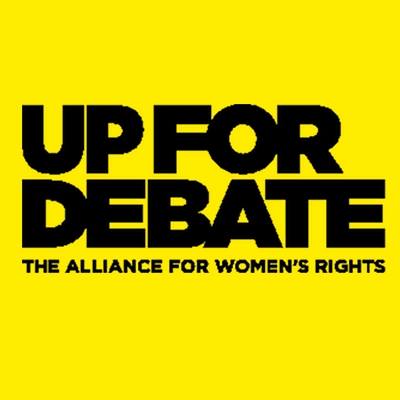Like this article? rabble is reader-supported journalism. Chip in to keep stories like these coming.
On Monday evening, four party leaders took part in Up for Debate’s panel on gender justice and equality: Liberal leader Justin Trudeau, NDP leader Tom Mulcair, Green leader Elizabeth May and Bloc Québécois leader Gilles Duceppe. Notably absent was Conservative leader Stephen Harper, who declined to participate, much to the delight of the evening’s emcee, Toronto comedian Jess Beaulieu, who tried to roast the prime minister in a wave of period jokes and helmet-hair quips.
In lieu of a traditional debate, the Up For Debate event featured pre-taped interviews of the four party leaders’ conducted by journalist Francine Pelletier, which focused on ending violence against women, ending women’s economic inequality and supporting women’s leadership.
A post-reel analysis of the leaders’ respective policy statements was debated by two panels, featuring journalists such as the Toronto Star’s Laurie Monsabraaten and progressive thinkers such as Hensel Barristers’ principal lawyer Katherine Hensel, and moderated by Maclean’s Laura Payton.
Pelletier described Trudeau, Mulcair, and Duceppe as “well-prepared, almost rehearsed, in their responses.” May was the exception, according to Pelletier, noting her fluency with gender analysis of policy issues: “she gets it.”
So what did the leaders say?
The leaders’ interview videos were intercut, making it difficult to gather a comprehensive picture of their respective platforms on women’s issues — something that a more conventional debate format would have mitigated. However, some party positions regarding child care, violence against women, and women’s equal representation in the workforce did take shape.
When confronted with Mulcair’s $40-million commitment to build women’s shelters, Trudeau countered with his party’s plan to invest $125 billion on social infrastructure.
May, Mulcair, and Trudeau all called for an inquiry into missing and murdered Indigenous women of Canada, with May and Mulcair emphasizing the need for a national program to combat violence against women. When asked about the sources of violence against women, Duceppe noted that there “are no rational explanations” while Trudeau made an oblique and deeply problematic reference to “certain kinds of music,” among other things.
And, in a moment enjoyed by several panelists, Trudeau and Mulcair jockeyed for position when it came to child-care provisions. Mulcair repeated the NDP’s promise to cap costs to parents at $15/day for child care, while Trudeau mentioned the Liberals’ Canada Child Care Benefit would provide (tax-free and income-tested) money directly to parents.
At one point, Trudeau and Mulcair both even outed themselves as feminists. Since Beyoncé’s glittery coming out party in August 2014, the “feminist” mantle has become a fashionable choice for public figures — even, it seems, for some of our prime ministerial prospects. There is, however, a difference between being feminist and doing feminism — a point made clear by by the panel discussion itself.
What was, perhaps, most striking about the Up For Debate event was the panel discussion, which evinced the systemic character of gender inequality.
For example, discussant Alejandra Bravo, Manager of Leadership and Learning at the Maytree Foundation, noted the degree of risk for women politicians who report workplace harassment; this enforces a culture of silence and dissuades women from pursuing governing roles. Although some party leaders spoke of the representative numbers of women in their parties, panelist Angela Robertson, executive director of the Central Toronto Community Health Centres, emphasized the need for feminist politics, not simply representation, in national leadership.
In another instance, Robertson identified the economy as a top federal priority requiring redress, identifying the pay gap and the disproportionate impact of precarious employment on women as key contributors to Canadian women’s vulnerability.
Panelist Kate McInturff, Senior Researcher at the Canadian Centre for Policy Alternatives, cited the $12-billion cost of violence against women, underscoring the connection between women’s issues and the economy. This crucial point contrasted harshly with how economic issues are discussed in mainstream political debates. The Globe debate on the economy only mentioned women once, while May, uninvited to the debate, was forced to tweet in her responses.
This speaks to why Canadians still need “women’s issues” forums in 2015.
In the run-up to the Up For Debate event, some media commentators eschewed the need for a debate on women’s issues, arguing that “it risks relegating crucial items — child care, gun control, aboriginal education, you name it — into a narrow category of ‘women’s issues’ when they are much broader societal challenges.”
It certainly does risk that. Moderator Payton commented on the panel’s own definition of “women’s issues” as an old-fashioned description of the policy concerns discussed during Up For Debate, indicating that they were quite mainstream. Robertson reminded viewers that to frame a call for a national child-care system as a “women’s issue” was sexist, and reinforced mainstream political commentary that refuses to incentivize men to be stay at home parents.
And, in many ways, feminism has outgrown the term “women’s issues,” which seems outdated in light of the complex, intersectional analysis foregrounded by the panelists on last night’s show.
But until the national political leadership catches up, we use the language and tools available to ensure that voices of the feminist politic are heard.
Watch the recording of the Up For Debate livestream here.
Samantha C. Thrift is an Instructor in the University of Calgary’s Department of Communication, Media and Film. Her research studies the social and political implications of feminist media, and she has published on the 1984 Canadian leadership debate on women’s issues, feminist humour and the 2012 Binders Full of Women meme, as well as the hashtag activism of #YesAllWomen.
Image: Up For Debate facebook page



